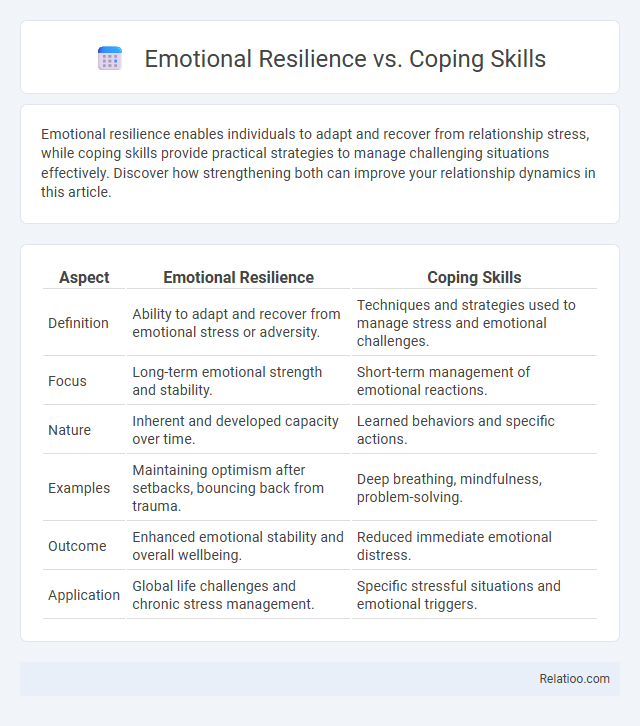Emotional resilience enables individuals to adapt and recover from relationship stress, while coping skills provide practical strategies to manage challenging situations effectively. Discover how strengthening both can improve your relationship dynamics in this article.
Table of Comparison
| Aspect | Emotional Resilience | Coping Skills |
|---|---|---|
| Definition | Ability to adapt and recover from emotional stress or adversity. | Techniques and strategies used to manage stress and emotional challenges. |
| Focus | Long-term emotional strength and stability. | Short-term management of emotional reactions. |
| Nature | Inherent and developed capacity over time. | Learned behaviors and specific actions. |
| Examples | Maintaining optimism after setbacks, bouncing back from trauma. | Deep breathing, mindfulness, problem-solving. |
| Outcome | Enhanced emotional stability and overall wellbeing. | Reduced immediate emotional distress. |
| Application | Global life challenges and chronic stress management. | Specific stressful situations and emotional triggers. |
Understanding Emotional Resilience: A Definition
Emotional resilience refers to Your ability to adapt and recover quickly from stress, adversity, or trauma by maintaining emotional balance. Unlike coping skills, which are specific strategies used to manage difficult emotions and situations, emotional resilience is a broader trait that involves mental toughness, emotional regulation, and a positive outlook. Understanding emotional resilience means recognizing it as the foundation that enables effective use of coping skills to navigate life's challenges confidently.
What are Coping Skills? An Overview
Coping skills are specific techniques and strategies you use to manage stress, regulate emotions, and navigate challenging situations effectively. These skills include problem-solving, mindfulness, and seeking social support, which help maintain emotional balance and prevent overwhelm. Developing strong coping skills enhances emotional resilience, allowing you to adapt and recover from adversity more efficiently.
Key Differences Between Emotional Resilience and Coping Skills
Emotional resilience refers to the ability to adapt and recover quickly from stress, adversity, or trauma, while coping skills are the specific strategies and techniques individuals use to manage emotional distress and challenges. Emotional resilience is a broader, long-term trait influenced by genetics, environment, and learned behaviors, whereas coping skills are situational, often temporary responses tailored to particular circumstances. Understanding the key differences helps in developing sustained emotional strength by enhancing resilience alongside practical coping mechanisms.
The Science Behind Emotional Resilience
The science behind emotional resilience reveals it as the brain's ability to adapt to stress and adversity through neural plasticity and regulatory processes involving the prefrontal cortex and amygdala. Coping skills are specific strategies like problem-solving and emotional regulation that support your capacity to manage stress, but emotional resilience encompasses a broader, enduring strength to bounce back from challenges. Research shows that fostering emotional resilience improves mental health outcomes by balancing emotional responses and enhancing psychological flexibility.
Types of Coping Skills: Adaptive vs. Maladaptive
Emotional resilience involves the ability to recover from stress, while coping skills are specific strategies employed to manage emotional challenges. Adaptive coping skills, such as problem-solving, seeking social support, and practicing mindfulness, promote emotional well-being and effective stress management. In contrast, maladaptive coping skills, including avoidance, substance abuse, and denial, may provide short-term relief but often exacerbate emotional distress and hinder recovery.
Benefits of Building Emotional Resilience
Building emotional resilience enhances your ability to recover quickly from stress, setbacks, and adversity, promoting long-term mental well-being. Unlike basic coping skills that manage immediate stress, emotional resilience strengthens your overall emotional stability and adaptability through consistent practice. Developing this resilience improves problem-solving, emotional regulation, and interpersonal relationships, leading to greater personal and professional success.
How Coping Skills Support Mental Health
Coping skills are essential tools that support mental health by enabling individuals to manage stress, regulate emotions, and navigate challenging situations effectively. These skills build emotional resilience, which is the ability to recover from setbacks and maintain psychological well-being during adversity. Developing strong coping mechanisms reduces vulnerability to anxiety, depression, and burnout, promoting long-term mental stability.
Developing Emotional Resilience: Practical Strategies
Developing emotional resilience involves strengthening your ability to adapt to stress and adversity through practical strategies such as mindfulness, positive self-talk, and building a strong support network. Enhancing coping skills like problem-solving and stress management techniques complements emotional resilience by providing tools to handle immediate challenges effectively. Prioritizing these approaches helps you maintain emotional balance and recover more quickly from setbacks.
Strengthening Coping Skills for Everyday Challenges
Emotional resilience involves the ability to recover quickly from stress, while coping skills are specific strategies employed to manage everyday challenges effectively. Strengthening coping skills, such as problem-solving, emotional regulation, and seeking social support, directly enhances emotional resilience by providing practical tools to navigate adversity. Developing these skills leads to improved mental health, increased adaptability, and sustained well-being during daily stressors.
Integrating Resilience and Coping Skills for Long-Term Wellbeing
Integrating emotional resilience and coping skills enhances long-term wellbeing by fostering adaptive responses to stress and adversity, enabling individuals to maintain psychological stability and recover swiftly from challenges. Emotional resilience involves the capacity to bounce back from emotional setbacks, while coping skills encompass specific strategies such as problem-solving, mindfulness, and emotional regulation that manage daily stressors effectively. Developing both resilience and coping mechanisms holistically supports sustained mental health, reduces the impact of chronic stress, and promotes overall life satisfaction.

Infographic: Emotional Resilience vs Coping Skills
 relatioo.com
relatioo.com